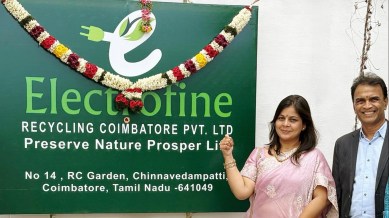Click here to join Express Pune WhatsApp channel and get a curated list of our stories
Pune Inc: From mobile phones to metal bars, how Electrofine is tackling India’s e-waste crisis
Pune-based Electrofine Recycling ensures that discarded electronics get decent ‘last rites’ that do not involve harming the environment.

India is an electronic powerhouse, with a NITI Aayog report from 2024 saying that the country’s electronics sector had experienced rapid growth, reaching $155 billion in the 2023-24 financial year. “Production nearly doubled from $48 billion in 2017-18 to $101 billion in 2023-24, driven primarily by mobile phones, which now constitute 43 per cent of total electronics production,” reads the report.
On the other side of this growth is the question of the afterlife of electronic devices.
monthly limit of free stories.
with an Express account.
This is the domain of Electrofine Recycling Pvt Ltd, a company that ensures that discarded electronics get decent ‘last rites’ that do not involve harming the environment. “The total capacity of the PCMC refurb unit is 4,000 metric tonnes annually. The annual capacity of the Satara factory is 20,000 metric tonnes,” says Vaishali Swaroop, its founder-managing director. Shashikant Gaikwad is the founder-CEO of the company.
In August, Electrofine took steps to set up a unit in Coimbatore to handle e-waste from South India, but Swaroop admits that their efforts are still a drop in the ocean of India’s e-waste problem.
According to a Rajya Sabha presentation by the Minister of State of the Union Ministry of Housing and Urban Affairs, Tokhan Sahu, in December 2024, the quantity of e-waste being generated in India rose from 1.01 million metric tonnes in 2019-20 to 1.751 million metric tonnes in 2023-24.
“Computers, phones, TVs, monitors, CD ROMs, hard disks, tablets, batteries, mixers, cables, and pen drivers are some electronic items that contain harmful material that can pollute the land, water, and air if not disposed of properly. It is crucial to handle e-waste carefully to protect people and the planet,” says Swaroop. Cadmium from batteries and circuits can collect in the body and harm the kidneys, bones and the respiratory system; mercury can affect the rain, liver and the immune system, among others; the health impacts of lead, especially in children, is severe; burning e-waste also releases carcinogenic polycyclic aromatic hydrocarbons.
Electrofine was born in 2021 as an e-waste recycling and refurbishment company committed to sustainable and eco-friendly solutions. “We serve clients across Maharashtra and India. Our mission is to transform e-waste management by implementing responsible, environmentally friendly practices that contribute to a greener future,” says Swaroop.
She adds that 30-35 per cent of laptops that come to them do not work at all and must be sent to the Satara factory. This is where metallurgical processes break down the e-waste into its basic components. “The aluminium, copper, brass, tin and bronze, among others, are separated and turned into metal bars. These are sold back as raw material to the copper and other industries. That is how e-waste enters a circular economy,” says Swaroop.
While awareness of single-use plastic pollution has increased over the years, the dangers of e-waste are still little known. It is a challenge for companies like Electrofine to spread the word. “We work to spread awareness in colleges, offices, IT companies, NGOs, and citizen groups but we need government initiatives, maybe in the form of regular advertisements, to keep the message in the public domain,” she says.
There are authorised vendors for the collection of e-waste, which ensures that these are disposed of responsibly. “The PCMC has taken a progressive step to collaborate with Electrofine for this purpose. It is our responsibility as Indian citizens to take informed decisions regarding e-waste,” says Swaroop.
Click here to join Express Pune WhatsApp channel and get a curated list of our stories